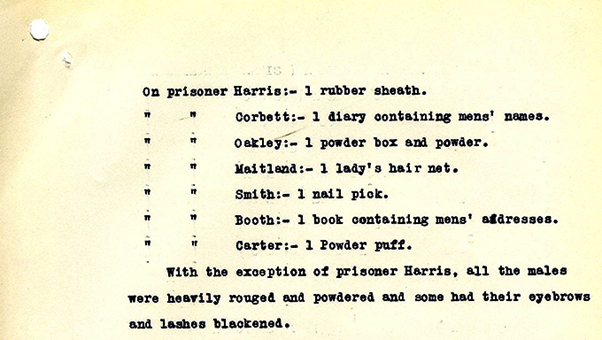In the 1920s and 1930s queer clubs & spaces were vulnerable to police raids.
Makeup was seen as a sign of effeminacy & therefore homosexuality.
Police would use blotting paper to test for powder & rouge.
📷: CRIM 1/1041
Makeup was seen as a sign of effeminacy & therefore homosexuality.
Police would use blotting paper to test for powder & rouge.
📷: CRIM 1/1041

At the LGBTQ+ friendly Caravan Club, described in the 1930s as ‘London’s greatest bohemian rendezvous’, patrons regularly wore make up.
📷: MEPO 3/758 & DPP 2/224

📷: MEPO 3/758 & DPP 2/224


During a raid of the private members club in 1934, a particularly flamboyant and bold individual, Cyril, had to undergo the humiliating process of having his face tested for evidence of make-up with blotting paper.
📷: WO195/15751
📷: WO195/15751

Billie’s Club, located on 6 Little Denmark Street (now Flitcroft Street), opened in 1935.
The scene that the police witnessed was described as:
the type of dancing which went on was thoroughly disgusting…With one exception all the men were powdered and rouged
📷: CRIM 1/903
The scene that the police witnessed was described as:
the type of dancing which went on was thoroughly disgusting…With one exception all the men were powdered and rouged
📷: CRIM 1/903

Not only were the individuals perceived to be wearing makeup, but it was noted that 'their hair was waved or dyed’ with one individual highlighted as having pink nails.
In this era police observations consistently related ‘effeminacy’ as a sign of homosexuality.
📷: DPP 2/355
In this era police observations consistently related ‘effeminacy’ as a sign of homosexuality.
📷: DPP 2/355

Rare material evidence of this practice survives in our collections; a piece of blotting paper smeared with make-up.
This was taken from the face of 44 year old waiter Knox.
📷: CRIM 1/1041
This was taken from the face of 44 year old waiter Knox.
📷: CRIM 1/1041

Knox was arrested in Piccadilly for soliciting men in the street – his face ‘highly coloured and his lips red,’ according to the officer – and sentenced to two years’ imprisonment.
📷: CRIM 1/1041
📷: CRIM 1/1041

Today was set to be #PrideInLondon.
Today, it seems particularly important to remember the people who fought to be their full, authentic selves in the past.
For more information, read our blog: blog.nationalarchives.gov.uk/policing-powde…
Today, it seems particularly important to remember the people who fought to be their full, authentic selves in the past.
For more information, read our blog: blog.nationalarchives.gov.uk/policing-powde…
• • •
Missing some Tweet in this thread? You can try to
force a refresh



![A promotional poster for the film Wicked Little Letters, showing the cast on a dark blue background, including Olivia Colman dressed in a green jacket and yellow hat, and Jessie Buckley in a white dress and Anjana Vasan, Malachi Kirby and Timothy Spall standing behind them. The phrase 'Be careful what you post' in pink lettering is in the centre and the film title 'Wicked Little Letters' - 'In cinemas February 23rd' at the bottom. [Image credit: Wicked Little Letters, Studio Canal UK ]](https://pbs.twimg.com/media/GKT1gSAWQAAcZQ7.jpg)










